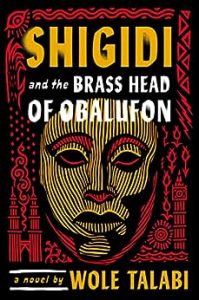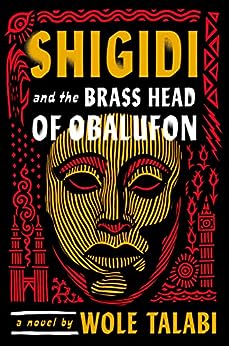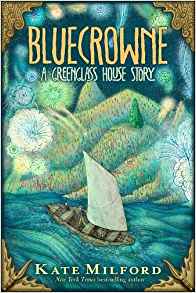Gary K. Wolfe Reviews Shigidi and the Brass Head of Obalufon by Wole Talabi
 Shigidi and the Brass Head of Obalufon, Wole Talabi (DAW 978-0-756-41826-7, $27.00, 320pp hc) August 2023.
Shigidi and the Brass Head of Obalufon, Wole Talabi (DAW 978-0-756-41826-7, $27.00, 320pp hc) August 2023.
It’s no news to any fantasy reader that gods are having a tough time of it these days. Neil Gaiman’s American Gods, which is emerging as one of the more influential fantasies of the current century, did much to codify the notion that ancient deities, whose very existence depended on belief, could barely keep up with a media-saturated world in which belief was as consumable as popcorn at the latest MCU flick. But, of course, it wasn’t only American gods (as Gaiman himself showed in Anansi Boys), and an impressive and growing number of international authors have been exploring the problems faced by gods from a range of cultures. In Wole Talabi’s terrifically entertaining first novel Shigidi and the Brass Head of Obalufon, what seems like the whole Yoruba pantheon is grappling with the depredations of modernity. In almost a direct nod to the kinds of challenges faced by Gaiman’s elder gods, the board of directors of the Orisha Spirit Company ‘‘voted to cut down the evil forest to make way for a shrine to cinema.’’ ‘‘The spirit market isn’t what it used to be,’’ the succubus Nneoma explains to Shigidi, the semiretired Yoruba god of nightmares who is her lover and the novel’s protagonist. As the name Orisha Spirit Company implies, one way the old gods have tried to adapt is to corporatize themselves, even adopting the double-talk of that culture (a scheme that goes awry, for example, is an ‘‘unforeseen process deviation’’, a phrase I bet SpaceX wishes they’d thought of). At times the Yoruba gods act like a multinational corporation, worried about losing market share to Christianity and setting up contracts and quarterly objectives for individual gods; at other times, they seem like a hopeless government bureaucracy, worried about trade agreements and border control laws; at still other times they function like the Mob, with ambitious underlings not hesitating to use extreme violence to gain position. By the end of the novel, we’ve also met a handful of gods and demons from other mythologies, and the tale suggests that they’re not much better.
While all this makes for fascinating context, it barely suggests how fast moving and sheerly entertaining Shigidi and the Brass Head of Obalufon is. We first meet Shigidi and Nneoma as they are fleeing through the streets of London in a wildly veering black cab, pursued by a furious demon in a chariot pulled by four bronze horses. A few days earlier, they had met with Olorun, the chief Yoruba deity and chairman of the board of the spirit company, who gave them the task of retrieving a powerful amulet from the British Museum – the brass head of Obulafon, the legendary Yoruba leader. (The idea of stealing an African artifact back from a museum which had plundered it in the first place is appealing.) But the head is protected not only by the usual security, but by a complex of spells woven by the Royal British Spirit Bureau, and Shigidi and Nneoma find themselves needing the help of some unusual allies. So while the contemporary plot is essentially a supernatural heist caper overlaid with a developing (and pretty hot) romance between the two principals, the events leading up to this take us from London to Malaysia, Nigeria, Algeria, Singapore, Ethopia, and various spirit realms, and range over more than a century (with one chapter, important to understanding Nneoma’s motivations, reaching all the way back to the 11th century).
Shigidi is a likeable enough protagonist, a minor god of nightmares who never liked his job much and now would like to get out of it, like a weary hitman needing to do just one more job. Far more of the action is precipitated by Nneoma, one of the more spectacular characters in recent fantasy. On the one hand she’s an ancient succubus whose memories go all the way back to ‘‘the Fall,’’ on the other she’s a relentlessly glamorous and irresistible seductress whose mastery of ‘‘sex magick’’ is evident in a few passages of pretty frank eroticism. She’s also a central player in a decades-long subplot involving the redoubtable real-life occultist Aleister Crowley, who simply will not leave fantasy novels alone. (He was an offstage figure in novels by T. Kingfisher and Silvia Moreno-Garcia in just the past few months.) Here he’s a rather hapless if power-hungry figure who quickly finds himself out of his league. Other characters, mostly orisha, include the fearsome and ruthless Shango, whose attack on Shigidi is one of the more spectacular and violent shapeshifting set pieces that pepper the novel without overwhelming it. In fact, one of the remarkable achievements of Shigidi and the Brass Head of Obulafon is how Talabi keeps in balance his kinetic mix of noir heist fiction, erotic romance, political intrigue, and supernatural fireworks without distracting too much from the genuinely affecting relationship between Nneoma and Shigidi, who are a pair we wouldn’t mind seeing again, and won’t forget anytime soon.
Gary K. Wolfe is Emeritus Professor of Humanities at Roosevelt University and a reviewer for Locus magazine since 1991. His reviews have been collected in Soundings (BSFA Award 2006; Hugo nominee), Bearings (Hugo nominee 2011), and Sightings (2011), and his Evaporating Genres: Essays on Fantastic Literature (Wesleyan) received the Locus Award in 2012. Earlier books include The Known and the Unknown: The Iconography of Science Fiction (Eaton Award, 1981), Harlan Ellison: The Edge of Forever (with Ellen Weil, 2002), and David Lindsay (1982). For the Library of America, he edited American Science Fiction: Nine Classic Novels of the 1950s in 2012, with a similar set for the 1960s forthcoming. He has received the Pilgrim Award from the Science Fiction Research Association, the Distinguished Scholarship Award from the International Association for the Fantastic in the Arts, and a Special World Fantasy Award for criticism. His 24-lecture series How Great Science Fiction Works appeared from The Great Courses in 2016. He has received six Hugo nominations, two for his reviews collections and four for The Coode Street Podcast, which he has co-hosted with Jonathan Strahan for more than 300 episodes. He lives in Chicago.
This review and more like it in the August 2023 issue of Locus.
 While you are here, please take a moment to support Locus with a one-time or recurring donation. We rely on reader donations to keep the magazine and site going, and would like to keep the site paywall free, but WE NEED YOUR FINANCIAL SUPPORT to continue quality coverage of the science fiction and fantasy field.
While you are here, please take a moment to support Locus with a one-time or recurring donation. We rely on reader donations to keep the magazine and site going, and would like to keep the site paywall free, but WE NEED YOUR FINANCIAL SUPPORT to continue quality coverage of the science fiction and fantasy field.
©Locus Magazine. Copyrighted material may not be republished without permission of LSFF.






